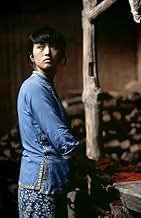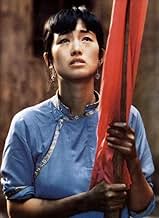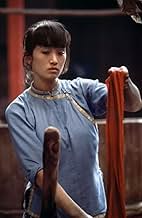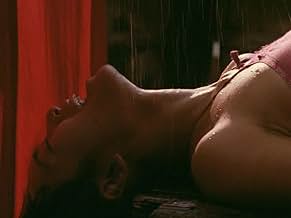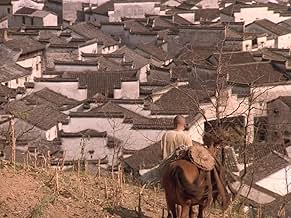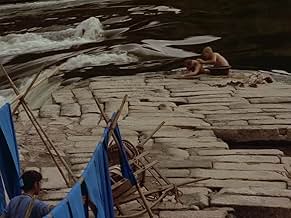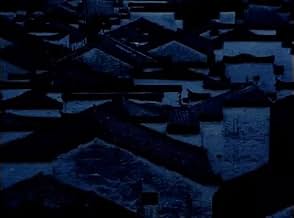AVALIAÇÃO DA IMDb
7,6/10
9,4 mil
SUA AVALIAÇÃO
Adicionar um enredo no seu idiomaIn rural China, the young bride of a tyrannical owner of a silk-dyeing business finds temporary solace in the arms of her husband's nephew, but problems arise when she becomes pregnant.In rural China, the young bride of a tyrannical owner of a silk-dyeing business finds temporary solace in the arms of her husband's nephew, but problems arise when she becomes pregnant.In rural China, the young bride of a tyrannical owner of a silk-dyeing business finds temporary solace in the arms of her husband's nephew, but problems arise when she becomes pregnant.
- Direção
- Roteirista
- Artistas
- Indicado a 1 Oscar
- 8 vitórias e 6 indicações no total
Avaliações em destaque
The title character, a peasant sold as a concubine to a cruel old man, is played by the beautiful Gong Li, one of the great actresses of our time who followed this brilliant work with spectacular performances in The Story of Qiu Ju (1991), Raise the Red Lantern (1992), and Farewell, My Concubine (1993). Li Wei plays her master, Yang Jin-shan, the childless owner of a dye mill in the agrarian China of the 1920s. Li Wei's fine performance combines craftiness with iniquity reminding me a little of the late great John Huston with scruffy beard. The third character in the tragic triangle is Jin-shan's nephew, Yang Tianqing, a modest man who does most of the work in the dye mill. The pent-up intensity of Li Baotian, who plays Tianqing, recalled to me at times the work of Ben Kingsley. Ju Dou falls in love with Tianqing almost by default, and it is their ill-fated love that leads to tragedy.
In some ways this visually stunning, psychologically brutal film about paternity and the old social order of China was Director Zhang Yimou's "practice" for the making two years later of his masterpiece, the afore mentioned, Raise the Red Lantern, one the greatest films ever made. The theme of patriarchal privilege is similar, and in both films Gong Li portrays a young concubine required to bear a son and heir to a cruel and ageing man of means. Even though the setting in both films is China in the twenties before the rise of Communism, both films very much annoyed the ageing leadership of Communist China and were censured (Ju Dou was actually banned), ostensibly for moral reasons, but more obviously because of the way they depicted elderly men in positions of power.
Ju Dou is the lesser film only in the sense that Sirius might outshine the sun were the two stars placed side by side. Both films are masterpieces, but for me Ju Dou was difficult to watch because of the overt cruelty of the master, whereas in Raise the Red Lantern, Yimou chose to keep the more brutal aspects of the story off camera. In a sense, then, Raise the Red Lantern is the more subtle film. It is also a film of greater scope involving more characters, infused with an underlining sense of something close to black humor. (The very lighting of the lanterns was slyly amusing as it ironically pointed to the subjugation.)
In Ju Dou there is virtually no humor and the emphasis is on the physical brutality of life under the patriarchal social order. Ju Dou is beaten and tortured while we learn that Jin-shan tortured his previous wives to death because of their failure to bear him an heir. The terrible irony is that it is Jin-shan who is sterile. He feels shamed in the eyes of his ancestors because the Wang line will die out with him. But a child is finally born through Ju Dou's illicit affair with Tianqing. (Note that this conjoining in effect saves Ju Dou's life.) Jin-shan thinks the infant is his son and briefly all is serenity. However, while two may live happily ever after, three will not. Notice too that now that Jin-shan has an heir, nephew Tianqing will inherit nothing.
Will they kill Jin-shan? Will fortuitous events put him out of the picture?
Will they find happiness? Will the boy learn the truth about his paternity? Yimou's artistry does not allow superficial resolution, you can be sure.
Note the two significant turns the film takes early on. One comes after Ju Dou discovers that Tianqing has been spying on her through a peep hole as she goes about her bath. At first she is mortified, and then sees this as a chance to show him the scars from the torture she endures daily, and then she shows him her body to allure him. The other turn comes as the child pronounces his first words by calling the old man "Daddy." Instantly Jin-shan, now confined to a wooden bucket that serves as a wheelchair, divines a deep psychological plan to realize his revenge. He embraces the child as his own, hoping to turn the boy against the illicit couple.
The strength of the film is in the fine acting, the beautiful sets, the gorgeous camera work, and in the unsentimental story that does not compromise or cater to saccharin or simplistic expectations. Yimou is a visual master who turns the wood gear- and donkey-driven dye mill of the 1920s into a tapestry of brilliant color and texture. Notable is the fine work that he does with the two boys who play the son at different ages. He has them remain virtually mute throughout and almost autistically cold. Indeed part of the power of this film comes from the depiction of the character of the son who grows up to hate who he is and acts out his hatred in murderous violence toward those around him.
Zhang Yimou is one of the few directors who can bring simultaneously to the silver screen the power of an epic and the subtlety of a character study. His films are more beautiful than the most lavish Hollywood productions and as artistically satisfying as the best in world cinema. The only weakness in the film is perhaps the ending which is played like a Greek tragedy for cathartic effect. One senses that Yimou and co-director Yang Fengliang in choosing the terminus were not entirely sure how this tale should end and took what might be seen as an easy way out.
(Note: Over 500 of my movie reviews are now available in my book "Cut to the Chaise Lounge or I Can't Believe I Swallowed the Remote!" Get it at Amazon!)
In some ways this visually stunning, psychologically brutal film about paternity and the old social order of China was Director Zhang Yimou's "practice" for the making two years later of his masterpiece, the afore mentioned, Raise the Red Lantern, one the greatest films ever made. The theme of patriarchal privilege is similar, and in both films Gong Li portrays a young concubine required to bear a son and heir to a cruel and ageing man of means. Even though the setting in both films is China in the twenties before the rise of Communism, both films very much annoyed the ageing leadership of Communist China and were censured (Ju Dou was actually banned), ostensibly for moral reasons, but more obviously because of the way they depicted elderly men in positions of power.
Ju Dou is the lesser film only in the sense that Sirius might outshine the sun were the two stars placed side by side. Both films are masterpieces, but for me Ju Dou was difficult to watch because of the overt cruelty of the master, whereas in Raise the Red Lantern, Yimou chose to keep the more brutal aspects of the story off camera. In a sense, then, Raise the Red Lantern is the more subtle film. It is also a film of greater scope involving more characters, infused with an underlining sense of something close to black humor. (The very lighting of the lanterns was slyly amusing as it ironically pointed to the subjugation.)
In Ju Dou there is virtually no humor and the emphasis is on the physical brutality of life under the patriarchal social order. Ju Dou is beaten and tortured while we learn that Jin-shan tortured his previous wives to death because of their failure to bear him an heir. The terrible irony is that it is Jin-shan who is sterile. He feels shamed in the eyes of his ancestors because the Wang line will die out with him. But a child is finally born through Ju Dou's illicit affair with Tianqing. (Note that this conjoining in effect saves Ju Dou's life.) Jin-shan thinks the infant is his son and briefly all is serenity. However, while two may live happily ever after, three will not. Notice too that now that Jin-shan has an heir, nephew Tianqing will inherit nothing.
Will they kill Jin-shan? Will fortuitous events put him out of the picture?
Will they find happiness? Will the boy learn the truth about his paternity? Yimou's artistry does not allow superficial resolution, you can be sure.
Note the two significant turns the film takes early on. One comes after Ju Dou discovers that Tianqing has been spying on her through a peep hole as she goes about her bath. At first she is mortified, and then sees this as a chance to show him the scars from the torture she endures daily, and then she shows him her body to allure him. The other turn comes as the child pronounces his first words by calling the old man "Daddy." Instantly Jin-shan, now confined to a wooden bucket that serves as a wheelchair, divines a deep psychological plan to realize his revenge. He embraces the child as his own, hoping to turn the boy against the illicit couple.
The strength of the film is in the fine acting, the beautiful sets, the gorgeous camera work, and in the unsentimental story that does not compromise or cater to saccharin or simplistic expectations. Yimou is a visual master who turns the wood gear- and donkey-driven dye mill of the 1920s into a tapestry of brilliant color and texture. Notable is the fine work that he does with the two boys who play the son at different ages. He has them remain virtually mute throughout and almost autistically cold. Indeed part of the power of this film comes from the depiction of the character of the son who grows up to hate who he is and acts out his hatred in murderous violence toward those around him.
Zhang Yimou is one of the few directors who can bring simultaneously to the silver screen the power of an epic and the subtlety of a character study. His films are more beautiful than the most lavish Hollywood productions and as artistically satisfying as the best in world cinema. The only weakness in the film is perhaps the ending which is played like a Greek tragedy for cathartic effect. One senses that Yimou and co-director Yang Fengliang in choosing the terminus were not entirely sure how this tale should end and took what might be seen as an easy way out.
(Note: Over 500 of my movie reviews are now available in my book "Cut to the Chaise Lounge or I Can't Believe I Swallowed the Remote!" Get it at Amazon!)
Gong Li is just about one of the most beautiful actresses in the world today. It is hard to believe that she has been acting for 20 years.
This is one of her earlier works, and it is an excellent example of her talent. It is also one of the early films for Yimou Zhang, who also directed Gong Li in Curse of the Golden Flower. He shows the promise of a great director in this film.
There is not much that is pleasant her. Ju Dou (Gong Li) is bought by an evil man who has beaten two wives to death for not bearing him a son. She is beaten mercilessly and he has constant sex with her to have a son.
The problem is not his wives, but him, and she has a son secretly with his nephew (Baotian Li). It saves her life, but matters continue to get more and more complicated until the final tragedy.
One of the really interesting features of the film is the Chinese funeral ritual.
The film is a great example of the early work of two great talents, but do not think that early means weak, as they were bother strong from the beginning.
This is one of her earlier works, and it is an excellent example of her talent. It is also one of the early films for Yimou Zhang, who also directed Gong Li in Curse of the Golden Flower. He shows the promise of a great director in this film.
There is not much that is pleasant her. Ju Dou (Gong Li) is bought by an evil man who has beaten two wives to death for not bearing him a son. She is beaten mercilessly and he has constant sex with her to have a son.
The problem is not his wives, but him, and she has a son secretly with his nephew (Baotian Li). It saves her life, but matters continue to get more and more complicated until the final tragedy.
One of the really interesting features of the film is the Chinese funeral ritual.
The film is a great example of the early work of two great talents, but do not think that early means weak, as they were bother strong from the beginning.
Ju Dou was censored and banned in China because it was considered politically dangerous by portraying the lead female character as rebelling against the male in authority. After it was promptly banned, it was resurrected and made available for Western Hemisphere audiences via the official protests of directors like Woody Allen, Martin Scorsese, George Lucas and Stephen Spielberg. As a result, we have at our disposal, one of the most beautifully constructed love stories ever made.
Despite the fact that this film was made within our contemporary era it presents an honest and frank portrayal without much sex or violence. Nevertheless, it still remains an intense piece of cinema. Interestingly, even though the story is set in the 1920's, the attitudes and manner of behavior reflect the attitudes of our times rather than the 1920's. The story is essentially a variation on a fairly familiar story-the basic premise being that of an older man being married to a younger woman, but is incapable of both satisfying her and providing offspring, so she finds a younger man who is capable of satisfying her. When she does, they conceive a child that the old man thinks is his. This usually makes for a poignant response to the old man's dilemma, because usually, the old man is portrayed as a sympathetic figure. In Ju Dou, he is anything but sympathetic, which makes for a whole new series of conflicting responses from the viewer.
Ju Dou is a film that transitions well between scenes, which is apparent in the film's structure. When seeing Ju Dou the viewer may want to take into consideration the three part structure of the film: a.) The beginning to where the old man becomes crippled b.) The second portion, which involves the birth of the son to where one of the lead character's dies and c.) The third portion, which involves the child. Ju Dou is a quiet and menacing film. When it hits its moments of high drama, it is very similar to a Greek tragedy. What stands out is the stoic nature of the characters, the incredible love scenes, and the final shocking conclusion.
Despite the fact that this film was made within our contemporary era it presents an honest and frank portrayal without much sex or violence. Nevertheless, it still remains an intense piece of cinema. Interestingly, even though the story is set in the 1920's, the attitudes and manner of behavior reflect the attitudes of our times rather than the 1920's. The story is essentially a variation on a fairly familiar story-the basic premise being that of an older man being married to a younger woman, but is incapable of both satisfying her and providing offspring, so she finds a younger man who is capable of satisfying her. When she does, they conceive a child that the old man thinks is his. This usually makes for a poignant response to the old man's dilemma, because usually, the old man is portrayed as a sympathetic figure. In Ju Dou, he is anything but sympathetic, which makes for a whole new series of conflicting responses from the viewer.
Ju Dou is a film that transitions well between scenes, which is apparent in the film's structure. When seeing Ju Dou the viewer may want to take into consideration the three part structure of the film: a.) The beginning to where the old man becomes crippled b.) The second portion, which involves the birth of the son to where one of the lead character's dies and c.) The third portion, which involves the child. Ju Dou is a quiet and menacing film. When it hits its moments of high drama, it is very similar to a Greek tragedy. What stands out is the stoic nature of the characters, the incredible love scenes, and the final shocking conclusion.
Mesmerizing melodrama set in 1920's China about a young woman who is forced to wed an abusive dye mill owner, who tortures her like an animal for not giving him a son, but more importantly, an heir. She decides to indulge in an affair with the nephew of her husband. Enthralling study of passion, sensation and burning for revenge brought to life in an extraordinary fashion which earned the film an Oscar nomination for the Best Foreign Language Film of 1990.
This allegorical melodrama is most notable for its use of color: the film is mostly set in a small dye factory/household and the beautiful, brilliant colors of the dye are in stark contrast to the drabness of the building itself and the ugly lives that are lived there. Life is so ugly because household head Jin-shan is an impotent old man who has recently purchased an expensive young wife. Since he did purchase her, he feels it is his right to beat her every time he fails to perform sexually. Soon, his adopted son Tian-qing gets wind of his step-moms' nightly beatings and he begins to comfort her. It doesn't take much of this comforting to get her pregnant with a son that ends up being even more evil than Jin-shan himself, especially since young Tian-bai refuses to acknowledge Tian-qing in any way.
Characterizations are very slim here, most likely to ensure that the viewer doesn't try to look at the characters as anything more than allegorical stand-ins for a government so repressive that they banned the film for portraying an extramarital affair and so stupid that they didn't realize that the film is highly critical of their regime. Jin-shen is the stand-in for the government that treats its people as slaves and he's ironically aided by the ignorant Tian-bai who completely fails to understand the situation and is guided by a misplaced loyalty. Of course the ill-fated central couple is representative of the middle class people who understand the situation they are in but lack the power to change it.
The film works as an allegory but comes off as rather unengaging if taken literally since the characters aren't fleshed out. This is a particular problem with Tian-qing as he has numerous chances to better his situation but never acts rationally and Tian-bai who acts completely inhuman. Still, the direction and visuals are handled well enough to keep the film from being a mere exercise in didacticism.
Characterizations are very slim here, most likely to ensure that the viewer doesn't try to look at the characters as anything more than allegorical stand-ins for a government so repressive that they banned the film for portraying an extramarital affair and so stupid that they didn't realize that the film is highly critical of their regime. Jin-shen is the stand-in for the government that treats its people as slaves and he's ironically aided by the ignorant Tian-bai who completely fails to understand the situation and is guided by a misplaced loyalty. Of course the ill-fated central couple is representative of the middle class people who understand the situation they are in but lack the power to change it.
The film works as an allegory but comes off as rather unengaging if taken literally since the characters aren't fleshed out. This is a particular problem with Tian-qing as he has numerous chances to better his situation but never acts rationally and Tian-bai who acts completely inhuman. Still, the direction and visuals are handled well enough to keep the film from being a mere exercise in didacticism.
Você sabia?
- CuriosidadesIn the original novel Tianqing is the biological nephew of Jinshan and the story itself is about incest by affinity. The makers of the film version decided not to use the incest angle, so in the film Tianqing and Jinshan are not biologically related.
Principais escolhas
Faça login para avaliar e ver a lista de recomendações personalizadas
- How long is Ju Dou?Fornecido pela Alexa
Detalhes
Bilheteria
- Faturamento bruto nos EUA e Canadá
- US$ 1.986.433
- Fim de semana de estreia nos EUA e Canadá
- US$ 10.300
- 10 de mar. de 1991
- Faturamento bruto mundial
- US$ 1.986.433
Contribua para esta página
Sugerir uma alteração ou adicionar conteúdo ausente

Principal brecha
By what name was Amor e Sedução (1990) officially released in Canada in English?
Responda

